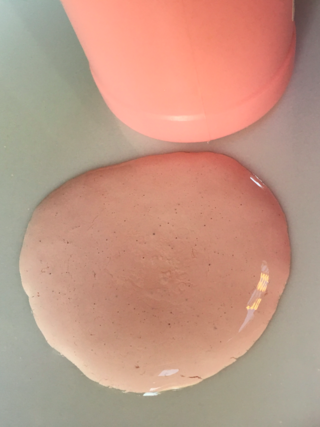Related Research Articles

Xylometazoline, also spelled xylomethazoline, is a medication used to reduce symptoms of nasal congestion, allergic rhinitis, and sinusitis. Use is not recommended for more than seven days. Use is also not recommended in those less than three months of age and some say not less than 6 years of age. It is used directly in the nose as a spray or drops.

Calamine, also known as calamine lotion, is a medication made from powdered calamine mineral that is used to treat mild itchiness. Conditions treated include sunburn, insect bites, poison ivy, poison oak, and other mild skin conditions. It may also help dry out skin irritation. It is applied on the skin as a cream or lotion.

Procarbazine is a chemotherapy medication used for the treatment of Hodgkin's lymphoma and brain cancers. For Hodgkin's it is often used together with chlormethine, vincristine, and prednisone while for brain cancers such as glioblastoma multiforme it is used with lomustine and vincristine. It is typically taken by mouth.

Hydralazine, sold under the brand name Apresoline among others, is a medication used to treat high blood pressure and heart failure. This includes high blood pressure in pregnancy and very high blood pressure resulting in symptoms. It has been found to be particularly useful in heart failure, together with isosorbide dinitrate, for treatment of people of African descent. It is given by mouth or by injection into a vein. Effects usually begin around 15 minutes and last up to six hours.

Diatrizoate, also known as amidotrizoate, Gastrografin, is a contrast agent used during X-ray imaging. This includes visualizing veins, the urinary system, spleen, and joints, as well as computer tomography. It is given by mouth, injection into a vein, injection into the bladder, through a nasogastric tube, or rectally.

Tetracaine, also known as amethocaine, is an ester local anesthetic used to numb the eyes, nose, or throat. It may also be applied to the skin before starting an intravenous (injection) to decrease pain from the procedure. Typically it is applied as a liquid to the area. Onset of effects when used in the eyes is within 30 seconds and last for less than 15 minutes.

Diphtheria antitoxin (DAT) is a medication made up of antibodies used in the treatment of diphtheria. It is no longer recommended for prevention of diphtheria. It is given by injection into a vein or muscle.
Prothrombin complex concentrate (PCC), also known as factor IX complex, sold under the brand name Kcentra among others, is a combination medication made up of blood clotting factors II, IX, and X. Some versions also contain factor VII. It is used to treat and prevent bleeding in hemophilia B if pure factor IX is not available. It may also be used for reversal of warfarin therapy. It is given by slow injection into a vein.

Factor VIII is a medication used to treat and prevent bleeding in people with hemophilia A and other causes of low factor VIII. Certain preparations may also be used in those with von Willebrand's disease. It is given by slow injection into a vein.
Procaine benzylpenicillin also known as penicillin G procaine, is an antibiotic useful for the treatment of a number of bacterial infections. Specifically it is used for syphilis, anthrax, mouth infections, pneumonia, diphtheria, cellulitis, and animal bites. It is given by injection into a muscle.
Ethinylestradiol/norethisterone (EE/NET), or ethinylestradiol/norethindrone, is a combination birth control pill which contains ethinylestradiol (EE), an estrogen and norethisterone (NET), a progestin. It is used for birth control, symptoms of menstruation, endometriosis, and menopausal symptoms. Other uses include acne. It is taken by mouth. Some preparations of EE/NET additionally contain an iron supplement in the form of ferrous fumarate.

Intravenous sugar solution, also known as dextrose solution, is a mixture of dextrose (glucose) and water. It is used to treat low blood sugar or water loss without electrolyte loss. Water loss without electrolyte loss may occur in fever, hyperthyroidism, high blood calcium, or diabetes insipidus. It is also used in the treatment of high blood potassium, diabetic ketoacidosis, and as part of parenteral nutrition. It is given by injection into a vein.

Intravenous sodium bicarbonate, also known as sodium hydrogen carbonate, is a medication primarily used to treat severe metabolic acidosis. For this purpose it is generally only used when the pH is less than 7.1 and when the underlying cause is either diarrhea, vomiting, or the kidneys. Other uses include high blood potassium, tricyclic antidepressant overdose, and cocaine toxicity as well as a number of other poisonings. It is given by injection into a vein.
Sulfadoxine/pyrimethamine, sold under the brand name Fansidar, is a combination medication used to treat malaria. It contains sulfadoxine and pyrimethamine. For the treatment of malaria it is typically used along with other antimalarial medication such as artesunate. In areas of Africa with moderate to high rates of malaria, three doses are recommended during the second and third trimester of pregnancy.

Ethinylestradiol/levonorgestrel (EE/LNG) is a combined birth control pill made up of ethinylestradiol, an estrogen and levonorgestrel a progestin. It is used for birth control, symptoms of menstruation, endometriosis, and as emergency contraception. It is taken by mouth. Some preparations of EE/LNG additionally contain an iron supplement in the form of ferrous bisglycinate or ferrous fumarate.
Ethambutol/isoniazid/pyrazinamide/rifampicin, also known as ethambutol/isoniazid/pyrazinamide/rifampin, is a medication used for tuberculosis. It is a fixed dose combination of ethambutol, isoniazid, pyrazinamide, and rifampicin. It is used either alone or with other antituberculosis medication. It is taken by mouth.

Iodine is used to treat and prevent iodine deficiency and as an antiseptic. For iodine deficiency it can be given by mouth or injection into a muscle. As an antiseptic it may be used on wounds that are wet or to disinfect the skin before surgery.

Salicylic acid is used as a medicine to help remove the outer layer of the skin. As such it is used to treat warts, skin tags, calluses, psoriasis, dandruff, acne, ringworm, and ichthyosis. For conditions other than warts, it is often used together with other medications. It is applied to the area affected.

Zinc sulfate is used medically as a dietary supplement. Specifically it is used to treat zinc deficiency and to prevent the condition in those at high risk. This includes use together with oral rehydration therapy for children who have diarrhea. General use is not recommended. It may be taken by mouth or by injection into a vein.

Fluorescein is used to help in the diagnosis of a number of eye problems. When applied as a drop or within a strip of paper to the surface of the eye it is used to help detect eye injuries such as foreign bodies and corneal abrasions. When given by mouth or injection into a vein it is used to help evaluate the blood vessels in the back of the eye during fluorescein angiography.
References
- 1 2 World Health Organization (2009). Stuart MC, Kouimtzi M, Hill SR (eds.). WHO Model Formulary 2008. World Health Organization. pp. 248, 257–58, 279, 287. hdl: 10665/44053 . ISBN 9789241547659.
- 1 2 3 4 5 6 "Dextran 70". The American Society of Health-System Pharmacists. Archived from the original on 3 January 2017. Retrieved 8 December 2016.
- ↑ British national formulary : BNF 69 (69 ed.). British Medical Association. 2015. p. 686. ISBN 9780857111562.
- ↑ BeMiller JN, Whistler RL (2012). Industrial Gums: Polysaccharides and Their Derivatives (3 ed.). Academic Press. p. 411. ISBN 9780080926544. Archived from the original on 2017-01-03.
- ↑ World Health Organization (2019). World Health Organization model list of essential medicines: 21st list 2019. Geneva: World Health Organization. hdl: 10665/325771 . WHO/MVP/EMP/IAU/2019.06. License: CC BY-NC-SA 3.0 IGO.